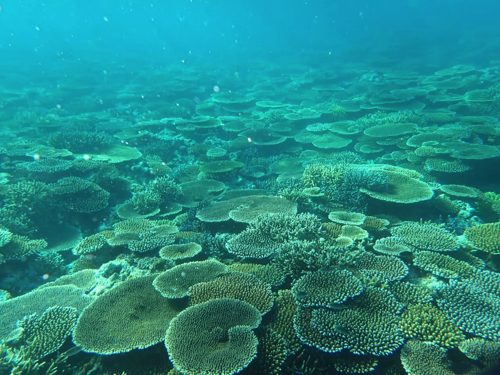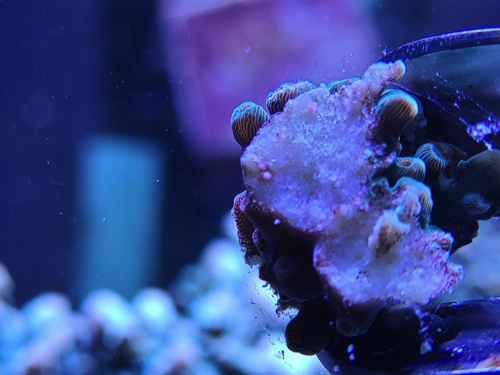J-STORIES ー Japanese researchers working on artificial breeding techniques for the revitalization of coral reef ecosystems, which are threatened with extinction, have made a breakthrough.
In January, a University of Tokyo start-up in Tokyo’s Toranomon district successfully hatched coral eggs for the second time in the environment of the company’s aquarium tanks. It also successfully controlled the timing of the hatching, which differed from in a natural environment.

Innoqua, a start-up working on the artificial regeneration of coral reefs, has brought together AI, IoT (Internet of Things) and the knowledge of aquarists (specialists in breeding aquatic life) to recreate the natural coral growth environment in an aquarium, without relying on ocean water.
According to CEO Yota Takakura, who founded the company in 2019, the aquarium reproduces the same water quality, water temperature and other conditions as the Okinawa ocean. But in the natural environment of Okinawa spawning is only seen around June and it would be impossible for spawning to occur in midwinter. If they go on to achieve spawning in the aquarium, it will be only the fourth time in the world and the first time in Japan.

Innoqua uses “environmental transfer” technology that artificially reproduces the natural environment of the sea. The core of the system is an aquarium management system called “Moniqua,” an abbreviation of “monitoring aquarium.” According to Saiko Katsunishi of the company’s PR department, not only can they create an environment for corals can grow in any aquarium, but their water temperature control technology makes it easier to reproduce and study coral bleaching, a phenomenon in which the number of zooxanthellae, a kind of algae in the coral decreases significantly, causing it to turn white.
Coral reefs account for only 0.2% of the world’s oceans by area, but are home to 25% of marine life. Alongside their role in providing shore protection and fishing grounds, coral reefs have great economic value, containing materials for various uses, including pharmaceuticals and construction. But it’s thought that over the next 20 years, 70% to 90% of coral reefs are likely to disappear due to rising sea water temperatures caused by climate change.
CEO Takakura replied by email to J-Stories’ questions about regenerating coral reefs under natural conditions. He said that, while it is possible to increase the number of coral species that can spawn artificially then return the young to the world’s oceans, he believes “the top priority is to solve fundamental environmental problems.”
He also pointed out that coral is attracting attention not only in relation to tourism and fishing, but also for the development of new medicines, such as the recent use of coral in the treatment of cancer. He expressed hope that “as coral research advances due to environmental transfer technology, the pharmaceutical industry’s need for coral will increase, adding economic value to coral.”
He said that the companies working at preserving coral reefs should change their stance from “protecting coral reefs because they are beautiful” to “protecting them because they are valuable.” This will lead to the realization of “a society that profits both people and nature.”
Translation and Editing by Tony McNicol
Top page photo by ivankmit/Envato
For inquires about this article, please contact us at jstories@pacificbridge.jp
***
***
Click here for the Japanese version of the article.





![[Podcast] Japanese technology to supercharge human fertility (Part 3)](https://storage.googleapis.com/jstories-cms.appspot.com/images/1766558713084place-for-scientific-research-2025-03-07-14-08-49-utc%20(1)_bigthumbnail.jpeg)
![[Interview: Part 2] A digital approach to tackle child hunger in Japan with dignity](https://storage.googleapis.com/jstories-cms.appspot.com/images/1766130666509unnamed_bigthumbnail.jpg)
![[Podcast] Japanese technology to supercharge human fertility (Part 2)](https://storage.googleapis.com/jstories-cms.appspot.com/images/1765863548035unnamed-7_bigthumbnail.jpg)
![[Podcast] Japanese technology to supercharge human fertility (Part 1)](https://storage.googleapis.com/jstories-cms.appspot.com/images/1765440905082unnamed_bigthumbnail.jpg)
_bigthumbnail.jpeg)





![[Interview] When digital and physical worlds meet](https://storage.googleapis.com/jstories-cms.appspot.com/images/1747974430456unnamed-2_smallthumbnail.png)




_smallthumbnail.jpeg)
![[Interview: Part 1] From nourishing souls to feeding the hungry](https://storage.googleapis.com/jstories-cms.appspot.com/images/1763695595492unnamed_smallthumbnail.jpg)

